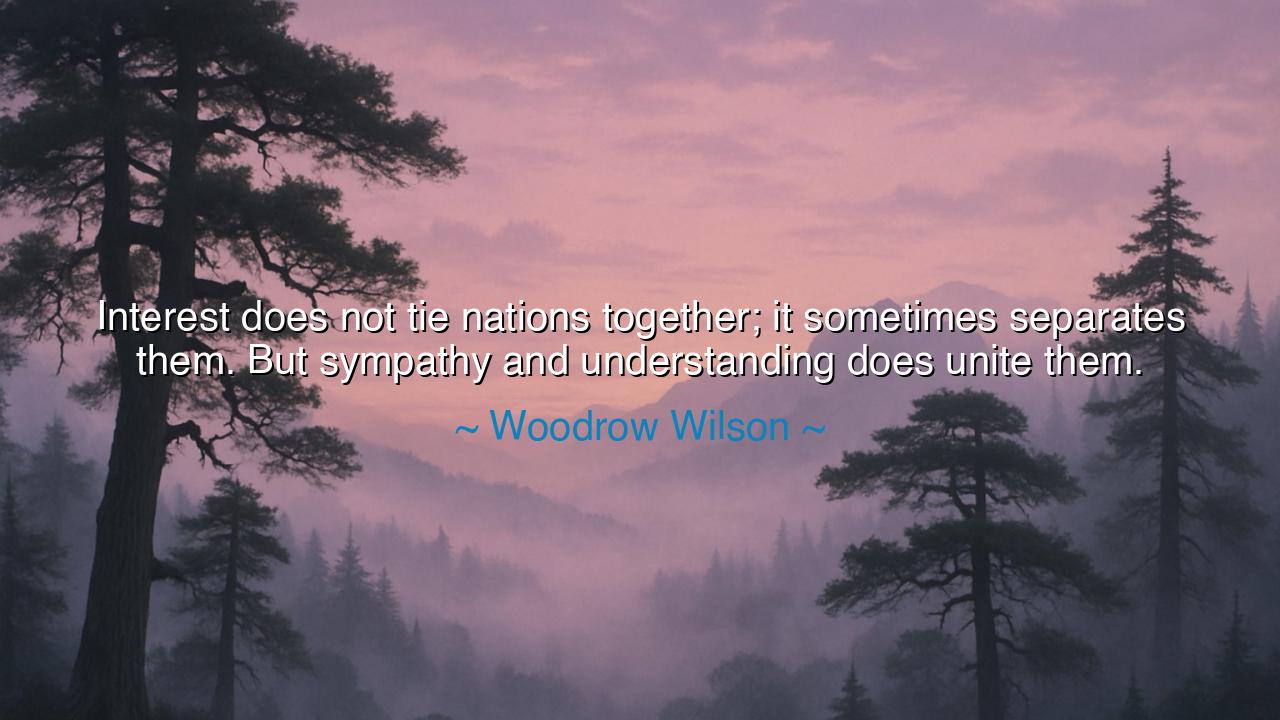
Interest does not tie nations together; it sometimes separates
Interest does not tie nations together; it sometimes separates them. But sympathy and understanding does unite them.






"Interest does not tie nations together; it sometimes separates them. But sympathy and understanding does unite them." These words from Woodrow Wilson carry the weight of wisdom that transcends time and circumstance. In this simple but powerful statement, Wilson speaks to the true forces that bind or divide nations, emphasizing that self-interest, while often a driving force in international relations, is ultimately a divisive power. It is sympathy and understanding—the shared human connections that transcend mere political or economic needs—that can bring nations together in a way that mere alliances and agreements never can. Wilson, speaking from the heart of a post-war world, understood that the reconciliation of nations required more than just treaties; it required the human heart to recognize the shared struggles and dreams of others.
Interest, whether in the form of trade, territory, or resources, is a force that often creates distance between nations. One nation seeks to protect its own prosperity at the expense of another, leading to rivalries, conflict, and division. This is the essence of what Wilson referred to—how national self-interest can cloud the broader picture and breed resentment. The world, in its striving for power and control, often fails to see that the wealth or dominance of one nation does not equate to the well-being of all. Rather, the pursuit of such interests often creates a zero-sum game, where the success of one nation is perceived as the loss of another, leading to endless cycles of competition and conflict.
History, especially the events surrounding World War I, illustrates the truth of Wilson's words. The war was fueled in large part by the interests of various European powers, who sought to expand their influence, territory, and resources. The alliances formed not from understanding or empathy, but from strategic interests, led to devastating consequences. Nations entered the war not because of a shared vision but because they felt it was in their best interest to do so. The aftermath of the war—devastating, tragic, and fractured—showed that interests alone could not heal the divisions created by the war. It was only with the League of Nations, an attempt at building international understanding, that Wilson hoped to bring about a system of collective security built on cooperation and empathy.
In contrast, it is sympathy and understanding—the ability to put oneself in the shoes of another—that fosters true unity. These are the forces that create lasting peace, the invisible bonds that tie people and nations together. Consider the Marshall Plan after World War II, where the United States, in an unprecedented act of generosity and empathy, extended financial assistance to help rebuild war-torn Europe. This was not an act of self-interest or dominance; rather, it was an acknowledgment of shared humanity. It recognized that for the world to heal, nations must understand each other's struggles and work toward a common good, not out of mere convenience but from a deeper sense of shared responsibility.
Sympathy is not just a feeling but a shared action, a recognition that the well-being of one nation is intrinsically tied to the well-being of all. When nations extend understanding toward each other, they create alliances that are built not on the shifting sands of political advantage, but on the solid ground of shared human dignity. This sentiment can be seen in the aftermath of the Berlin Wall's fall, when nations that once stood on opposite sides of the Cold War were able to come together and embrace each other's shared freedom. The shared empathy for the struggles of people seeking liberty and peace brought forth a new era of international cooperation, one based not on military dominance, but on the recognition of common human values.
The lesson in Wilson's words is both timeless and vital: that the forces of sympathy and understanding are the true catalysts for peace, unity, and human progress. In our own lives, we must reflect on the relationships we cultivate—not only with those close to us but also with those from different nations, cultures, and backgrounds. Are we driven solely by self-interest, or do we seek to build bridges through empathy and mutual understanding? The political division and conflict that so often define global relations can be mitigated, if not resolved, by a shared willingness to understand one another’s struggles, histories, and aspirations.
In practical terms, Wilson's philosophy challenges us to engage with others in ways that go beyond mere transactional exchanges. We must strive to seek out understanding, not just of people who are like us, but of those who differ from us—be it in culture, ideology, or background. This means listening more deeply, empathizing more sincerely, and looking beyond the superficial boundaries that separate us. As individuals, we can cultivate this mindset in our personal lives, in our communities, and in our global interactions, understanding that it is shared humanity, not self-interest, that will guide us toward a more unified, peaceful world. Just as the past has shown the divisiveness of interest, so too does the future offer us the promise of a more harmonious world, built on the foundation of mutual understanding and compassion.






AAdministratorAdministrator
Welcome, honored guests. Please leave a comment, we will respond soon